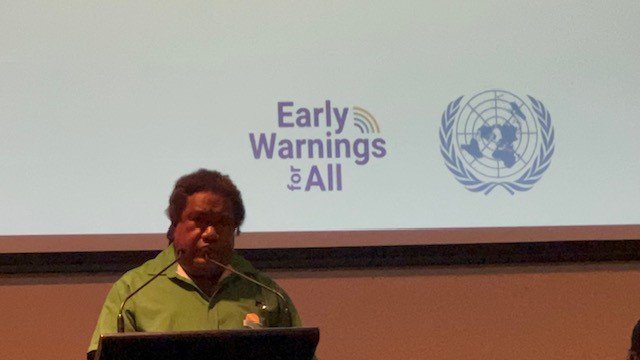
SOLOMON ISLANDS RECEIVES 8.1 MILLION US DOLLARS TO BOOST ITS WEATHER OBSERVATIONAL CAPABILITIES.
The Solomon Islands Meteorological Services (SIMS) plays a critical role in public safety and the development of the country. Being an essential service of the government, SIMS needs to have a sufficient weather monitoring network in targeted locations around the country transmitting data to a common location for the development of forecasts, climate services and climate change monitoring.
This issue will now be addressed through the funds received from the Systematic Observation Financing Facility (SOFF) that was launched during the 27th session of the Conference of Parties (COP) to the Paris Agreement in 2023.
Solomon Islands received a major boost to strengthen its weather monitoring capabilities from the Systematic Observation Financing Facility (SOFF). The investment of 8.1 million US dollars will enable the Solomon Islands Meteorological Services to close the current gaps in weather data for resilient development and better early warning for communities. This makes the Solomon Islands the second country in the Pacific to secure funds from SOFF after Kiribati successfully.
The approval of the SOFF Investment Proposal was reached after a year-long process of conducting the Readiness Assessments and the Gap Analysis of the state of weather monitoring instruments, weather data management system, staff capacity and institutional arrangements for the sustainability of SIMS.
The SOFF Investment Phase will be implemented in close collaboration with the Australian Bureau of Meteorology as the peer advisor and the United Nations Development Program office in the Solomon Islands as the implementing entity.
The SOFF is a new financing initiative co-created by the World Meteorological Organization specifically to support its member states in implementing the Global Basic Observations Network (GBON) Regulations which provide a benchmark against which investment in meteorological infrastructure can be measured.
SIMS has benefited from the installation of Automatic Weather Stations (AWS) through its past engagements with different stakeholders however those were mainly associated with climate adaptation initiatives in the agriculture and water sectors.
Many of those stations are no longer in operation and none of the operational stations are connected to the WMO Integrated Global Observing Systems (WIGOS) to support Global Numerical Weather Predictions. The Global Numerical Weather Predictions (GNWP) provides the fundamental backbone of all weather and climate products and services.
SIMS used to operate only one Upper Station located at the Vavaya Ridge Office which has not been in operation for over a decade. The Upper Air observations are critical for understanding the vertical conditions of the atmospheric variables over a given location.
The atmosphere has no horizontal boundaries and boundary conditions for even short-range predictions must involve the entire globe domain. The weather predictions for any location on the globe for 3-4 days require observations from the whole world. Lack of observations limits the ability to monitor, understand and predict weather and climate both locally and globally. The Pacific region including the Solomon Islands is one of those areas with significant data gaps.
The SOFF was created to help the member states close that gap with a specific focus on the Least Developed Countries and Small Island Developing States (SIDS). Solomon Islands proposal was considered under those two categories including the post-conflict state category.
In response to this recent development, the Director for Solomon Islands Meteorological Services (SIMS) who is also Solomon’s Representative to the WMO Council, David Hiba Hiriasia expressed his appreciation to WMO and SOFF for choosing Solomon Islands to be amongst the first recipients. Through this initiative, we will be upgrading all our Provincial Weather Stations with the latest equipment’s and communication system.
The SOFF comprises three phases, the Readiness, Investment and Compliance phases which will be implemented over five years. The Gap Analysis conducted in 2023 identified that for Solomon Islands to be compliant with Global Basic Observation Network (GBON) regulations, it needs to have at least three upper stations and an additional eight Automatic Weather Stations installed throughout the country and contributing to WIGOS. The Investment Phase of this initiative will be for the first three years with the remaining two for compliance.
Under this arrangement, UNDP will manage the funds and install the key infrastructure under the guidance of BOM and SIMS. The collaboration between SIMS and its stakeholders is a result of the ongoing partnership in early warning, climate and ocean programs and
The successful transition of Solomon Islands from the Investment to Compliance Phase will enable the country to receive revenue for its contribution to WIGOS to support the global numerical weather predictions therefore part of SOFF Investment will also look into strengthening the governance and institutional arrangements for revenue generation from the provision of weather data and climate products and services to a wide range of sectors.
Representatives from SIMS, UNDP and BOM were part of a three-day meeting for all National Meteorological and Hydrological Services in Nadi, Fiji two weeks ago to discuss the inception of SOFF in the Pacific and collaborations with other initiatives. Among those were discussions on the collaboration with the Pacific Weather Ready Program under the South Pacific Regional Environmental Program (SPEP) and the UN Secretary General’s initiative on Early Warning For All (EW4ALL) currently led by the United Nations Disaster Risk Reduction Office. All of these initiatives will also be featured in the Fourth International Conference on Small Islands Developing States (SIDS) in Antigua and Barbuda in late May 2024 including the recent achievements of SIMS.
Mr. Hiriasia also emphasized that the SOFF initiative will complement other ongoing engagements between SIMS and regional partners as well as the NGOs in Solomons. Speaking on behalf of his staff members, Mr Hiriasia said that the entire SIMS team is looking forward to this innovation in meteorology in the Solomon Islands and expressed gratitude to all its stakeholders and partners for the good collaboration.
ENDS//
– MECDMM Press Release
